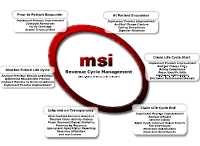Financial Health and Predictability
Revenue Cycle Management
Claim errors that delay or preclude payment can occur throughout the process of encountering a patient, not just in the billing office. Traditional claims management methods focus on the Life Cycle of claims. A back-end process of correcting claim related mis-information and stimulating claim activity. While this is an essential component of Revenue Cycle Management, Life Cycle methods fail to identify the source of the mis-information and allow for proactive correction.
Minimizing the Claim Life-Cycle both improves revenue performance, and reduces operational costs by increasing the effectiveness of resources.
Revenue Cycle Management RCM is centered on continuous process improvements. A front-end method where focus is on assuring that all available information is accurately recorded and utilized so that the claim will be rapidly paid. This data intensive, all-inclusive process takes into account every step involved in generating practice revenue. Beginning with the intial point of contact with the patient through claim resolution.
Technology and Business Rules
Using the data wharehouse behind Medi-Net and business rules within Medi-Net, expected performance metrics are then continually compared to the Life-Cycle period of each claim and overall payment/denial trends. The process responsible for underperformance is then identified and corrected to shorten the Life Cycle on future claims.
To start the RCM process, MSI provides every new client with a comprehensive analysis of their charge capture accuracy, existing claims denial trends, slow pay and underpay payors, and operational methods. We identify each area of potential improvement and provide improved techniques for accurately gathering, documenting and disseminating information.

